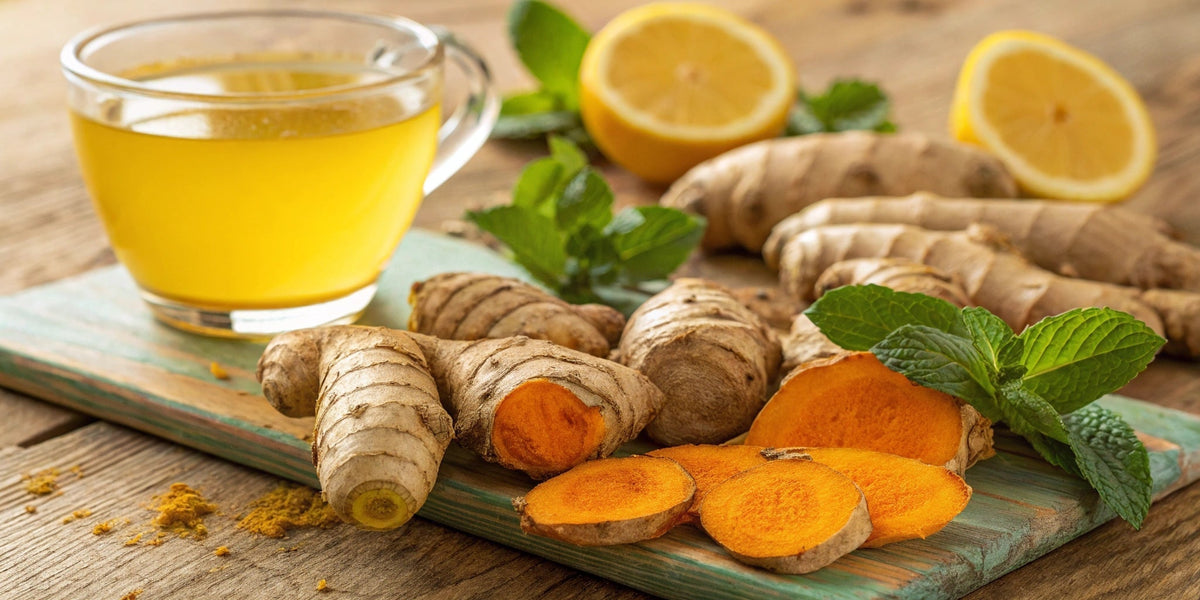
How Ginger and Turmeric Fight Inflammation
|
|
Time to read 6 min
|
|
Time to read 6 min
Key Points:
Inflammation is a hot topic these days, and for good reason. Chronic inflammation has been linked to a host of health issues, from digestive disorders and joint pain to heart disease and cancer. While some inflammation is a normal and necessary part of the body's healing process, persistent low-grade inflammation can silently wreak havoc on your health over time.
The good news is that nature has provided us with some potent tools for keeping inflammation in check - and two of the most powerful are the spicy, flavorful roots of ginger and turmeric.
In this post, we'll dive into the science behind these anti-inflammatory superfoods and explore easy ways to incorporate them into your diet for optimal health.
Before we get into the nitty-gritty of how ginger and turmeric fight inflammation, let's do a quick refresh on what inflammation actually is and why it matters for your health.
Inflammation is your body's natural response to injury, infection, or irritation. When you cut your finger or catch a cold, your immune system jumps into action, sending specialized cells and chemicals to the affected area to fight off invaders, clean up damaged tissue, and start the healing process.
This acute inflammatory response is a good thing - it helps protect you from harm and facilitates recovery. But sometimes, due to factors like chronic stress, unhealthy diet, sedentary lifestyle, or underlying health issues, the inflammatory response can get stuck in the "on" position, even when there's no overt threat to fight off.
This chronic low-grade inflammation can simmer below the surface for months or years, quietly damaging cells and tissues throughout the body.
Over time, this can contribute to the development of serious health conditions like:
In fact, some experts now believe that chronic inflammation may be the root cause of most, if not all, chronic diseases.
So, what can you do to quell the inflammatory fires within?
While there are many diet and lifestyle factors that can help, two of the most potent inflammation-fighting foods are ginger and turmeric.
Let's take a closer look.
Ginger is a spicy, aromatic root that's been used for thousands of years in traditional medicine systems around the world to treat everything from nausea and indigestion to pain and inflammation.
Modern science has confirmed many of these ancient uses, showing that ginger contains powerful anti-inflammatory compounds called gingerols and shogaols. These substances work by inhibiting the production of pro-inflammatory chemicals in the body, such as cytokines and chemokines.
Some specific ways ginger has been shown to reduce inflammation include:
To get the anti-inflammatory benefits of ginger, you can incorporate fresh ginger root into your cooking, steep ginger tea, or take a high-quality wellness shot like Defense.
Turmeric is a vibrant yellow spice that's been used for centuries in Ayurvedic and Chinese medicine to treat a variety of inflammatory conditions. The main active compound in turmeric, curcumin, has been extensively studied for its potent anti-inflammatory and antioxidant properties.
Like ginger, curcumin works by inhibiting the production of pro-inflammatory compounds in the body. But it also has some unique anti-inflammatory mechanisms, such as 5 :
Thanks to these multi-pronged effects, curcumin has been shown to be a powerful ally in fighting various inflammatory conditions. Some specific benefits include:
To get the anti-inflammatory benefits of turmeric, you can add the fresh root or dried spice to curries, stir-fries, soups, and more. Golden milk, or turmeric latte, has also become a popular way to enjoy the spice.
However, curcumin is poorly absorbed on its own, so for maximum benefit, look for turmeric wellness shots that also contain black pepper extract for enhanced absorption, like Immunity or Vitality shots.
While both ginger and turmeric are powerful inflammation fighters on their own, research suggests that combining the two may offer even greater benefits.
In one study, a combination of ginger and curcumin was found to be more effective than either compound alone in reducing inflammation and preventing the growth of colorectal cancer cells 10 .
Another study found that co-administering curcumin and ginger significantly reduced inflammatory markers and improved quality of life in people with knee osteoarthritis 11 .
These synergistic effects are likely due to the complementary anti-inflammatory mechanisms of ginger and turmeric.
By inhibiting multiple inflammatory pathways and reducing oxidative stress through different means, the combination offers a multi-targeted approach to quelling inflammation.
If you're looking for a quick and easy way to get your daily dose of ginger and turmeric, wellness shots may be the answer. These concentrated elixirs typically contain high doses of ginger and turmeric extracts, along with other anti-inflammatory ingredients like black pepper, lemon, and cayenne.
Some benefits of ginger turmeric wellness shots include:
When choosing a ginger turmeric shot, look for one that uses high-quality, organic ingredients and contains a standardized dose of curcumin and gingerols. Avoid shots with added sugars or artificial preservatives.
To maximize the anti-inflammatory benefits, try taking a shot daily on an empty stomach, either first thing in the morning or before meals.
Chronic inflammation is a silent threat that underlies many of the chronic diseases we face today. But the good news is that we have the power to fight back - and two of the most potent weapons in our anti-inflammatory arsenal are ginger and turmeric.
These flavorful, medicinal roots have been used for centuries to treat inflammatory ailments, and modern science is now confirming their efficacy.
By incorporating ginger, turmeric, and other anti-inflammatory foods and lifestyle practices into your daily routine, you can help quell the inflammatory fires within and promote optimal health from the inside out.
So the next time you're looking to spice up your anti-inflammatory regimen, consider reaching for the power couple of ginger and turmeric - your body will thank you!



